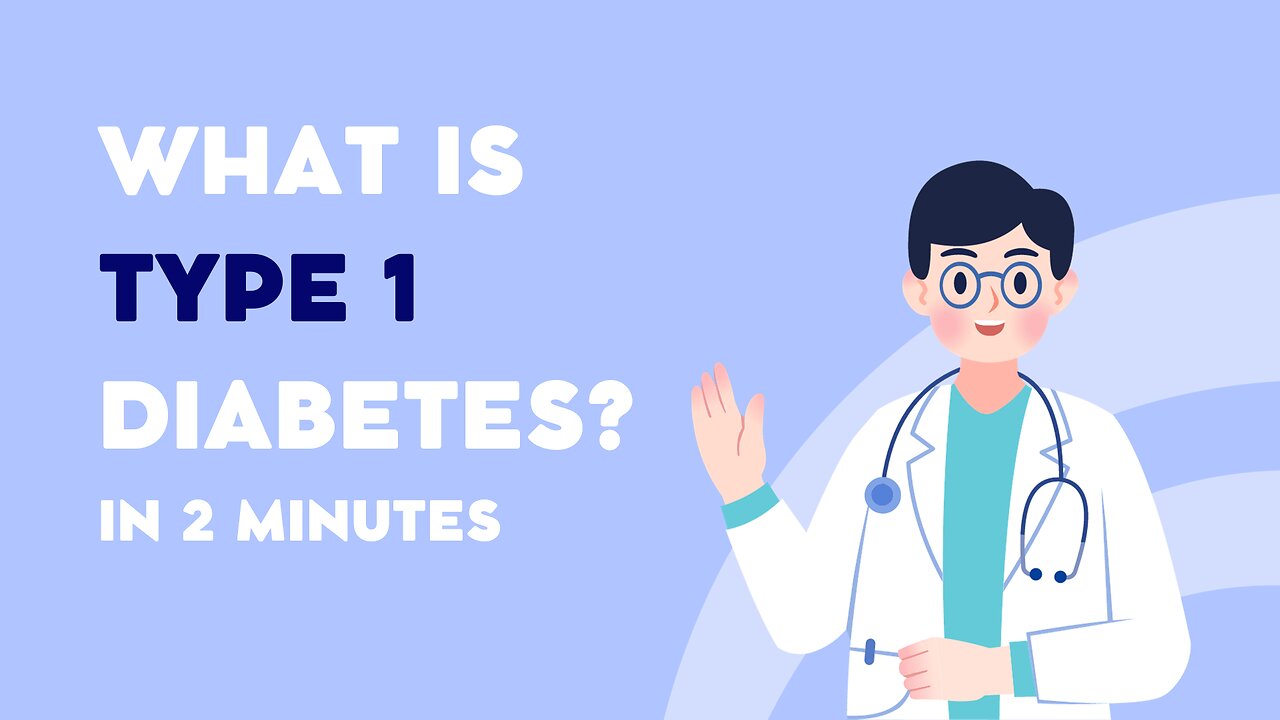Premium Only Content

What is Type 1 Diabetes in 2 Minutes
Type 1 diabetes, often referred to as "juvenile diabetes" or "insulin-dependent diabetes," is a chronic autoimmune condition in which the immune system mistakenly attacks and destroys the insulin-producing beta cells in the pancreas. As a result, the pancreas is unable to produce insulin, a hormone that regulates blood sugar (glucose) levels in the body.
Here are some key characteristics and features of Type 1 diabetes:
Autoimmune Disorder: Type 1 diabetes is an autoimmune disease, which means the body's own immune system attacks and destroys healthy cells. In this case, the immune system targets and damages the beta cells in the pancreas that produce insulin.
Insulin Dependency: People with Type 1 diabetes require lifelong insulin therapy because their bodies do not produce any insulin. Without insulin, the body cannot properly regulate blood sugar levels.
Onset in Youth: While Type 1 diabetes can develop at any age, it often starts in childhood or adolescence. However, it can also occur in adults.
Symptoms: The symptoms of Type 1 diabetes include excessive thirst (polydipsia), frequent urination (polyuria), unexplained weight loss, extreme hunger (polyphagia), fatigue, and blurred vision. These symptoms can develop relatively quickly.
Blood Sugar Management: Managing blood sugar levels in Type 1 diabetes requires a combination of insulin therapy, regular blood glucose monitoring, and careful attention to diet and exercise. The goal is to keep blood sugar levels within a target range to prevent both short-term and long-term complications.
Complications: If not properly managed, Type 1 diabetes can lead to various health complications, including heart disease, kidney disease, nerve damage (neuropathy), eye problems (retinopathy), and circulation issues. However, with good blood sugar control and proper medical care, the risk of complications can be reduced.
Treatment: Treatment for Type 1 diabetes primarily involves insulin replacement therapy. Insulin can be administered through injections or an insulin pump. The specific insulin regimen and dosage may vary from person to person based on their individual needs.
Lifestyle Management: People with Type 1 diabetes also need to pay close attention to their diet, exercise regularly, and monitor their blood sugar levels regularly. These lifestyle factors play a crucial role in managing blood sugar levels.
Type 1 diabetes is a lifelong condition that requires continuous self-management and medical care. Research into diabetes treatment and management is ongoing, with ongoing efforts to improve insulin delivery methods and find potential cures or therapies to prevent the development of Type 1 diabetes.
-
 4:14
4:14
The Rubin Report
1 day agoDave Rubin Shares Behind-the-Scenes Story of What Charlie Kirk Did for Him
42.3K22 -
 1:58:58
1:58:58
Badlands Media
1 day agoDevolution Power Hour Ep. 389: Psyops, Patsies, and the Information War
88.8K91 -
 2:13:55
2:13:55
Tundra Tactical
7 hours ago $9.23 earnedTundra Talks New Guns and Remembers Charlie Kirk On The Worlds Okayest Gun Show Tundra Nation Live
33.4K4 -
 1:45:08
1:45:08
DDayCobra
8 hours ago $36.45 earnedDemocrats Caught LYING Again About Charlie Kirk's KILLER
68.4K79 -
 19:23
19:23
DeVory Darkins
10 hours ago $14.79 earnedShocking Update Released Regarding Shooter's Roommate as Democrats Issue Insane Response
46.2K146 -
 19:53
19:53
Stephen Gardner
12 hours ago🔥EXPOSED: Charlie Kirk Shooter's Trans Partner Tells FBI EVERYTHING!
63.3K317 -
 2:47:25
2:47:25
BlackDiamondGunsandGear
7 hours agoAfter Hours Armory / RIP Charlie Kirk / What we know
38.6K6 -
 29:09
29:09
Afshin Rattansi's Going Underground
1 day agoThe Political Life of Malcolm X: Busting the Myths (Prof. Kehinde Andrews)
49.9K13 -
 2:47:25
2:47:25
DLDAfterDark
8 hours ago $5.47 earnedThe Assassination of Charlie Kirk - Just What We KNOW
30.4K6 -
 1:33:56
1:33:56
MattMorseTV
9 hours ago $40.19 earned🔴Exposing his PARTNER IN CRIME.🔴
85K277